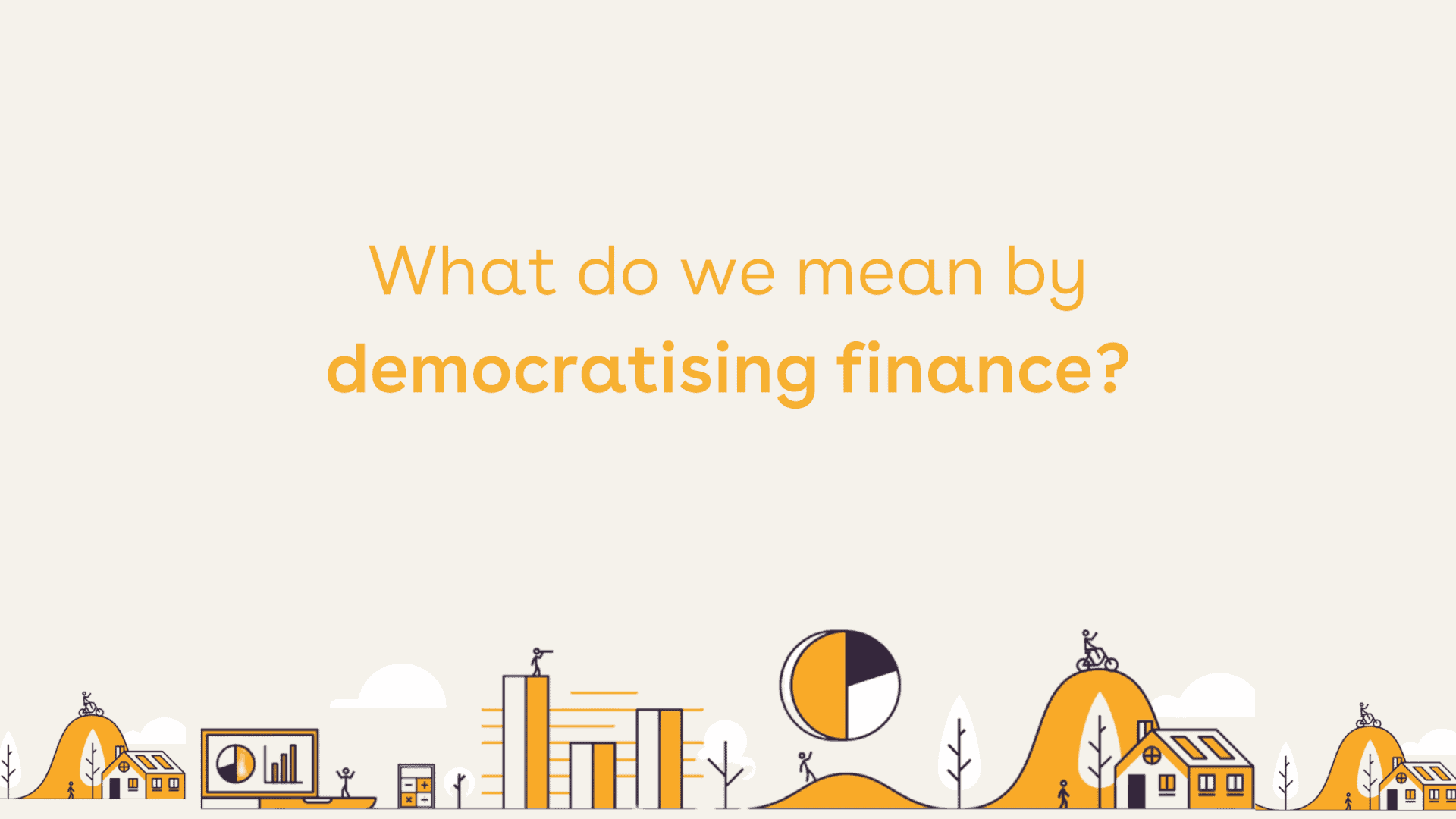


Investments
Our investment strategy is one of the key ways Friends Provident Foundation affects positive change.

Our approach to investment
We view our endowment as a tool for advancing our mission. Our goal is to ensure that our investment not only generates financial returns but also contributes to positive social and environmental outcomes.
Investing our endowment involves making decisions on what to invest in, what not to invest in, how we exercise our stewardship responsibilities, and how we engage with the financial system. We believe these decisions should contribute to our aim of building an economy that is environmentally sustainable and fair.
Key investment documents
Investment principles and policy
Investment statement on climate change
Our investment strategy and portfolio
Our Investment Principles and Policy drive our investment work. As a participant in the financial system through our endowment we have the opportunity to promote change that serves our mission by:
- providing cash for grants and operations
- supporting engagement with our asset managers and other financial system actors
- supporting engagement with companies
- social investment and impact investment
The document lays out:
- The areas that take precedence when we make decisions about investments.
- Areas in which we will never invest, as we deem them to be fundamentally inconsistent with our mission.
- How we use our influence as shareholders, both independently and in collaboration with other investors, to encourage practices that better align with our mission.
The majority of our endowment is invested in funds labelled responsible or sustainable. Our investment managers for these funds are:
- Columbia Threadneedle Investments
- Cazenove Capital
We were an early adopter of social investment and impact investment in the UK, making our first investment in 2007. Trustees have adopted a target portfolio which would mean, by 2026, 33% of the value of our endowment could be used to make impact-first investments in social enterprises and impact funds.
Trustees are willing to take on a higher level of risk where the investment is close to our purpose. Part of our commitment to making impact-first investments includes our founding investor position in the Snowball Impact Investment Fund. We also invest directly in Snowball Impact Management, among a range of social investments featured below.
Our investment adviser is:
The primary aim of our social investments is to achieve the Foundation’s charitable purposes through investment instruments. The secondary aim of our social investments is to produce a financial return. When making social investments, we pay considerable attention to how the investments contribute towards our vision of a 4D Economy.
For our banking services, we use:
- Charities Aid Foundation (CAF) Bank
- Triodos Bank
We use Barclaycard for credit cards
We also work with other charities, foundations, and like-minded investors to progress our investment objectives, including as members of ShareAction’s Charities Responsible Investment Network (CRIN), Church Investors Group (CIG), the Social Impact Investors Group (SIIG) organised by the Association of Charitable Foundations (ACF), Shareholders for Change, and ShareAction’s coalitions to promote Good Work and raising banking standards on climate.
Our social investment portfolio
Snowball Impact Management
Snowball Impact Management – ground-breaking new 100% impact investment fund. In 2020, they restructured to create Snowball Impact Management and Fund (GP/LP structure) to allow new investors. Snowball applies a social and environmental impact lens to all its investment analysis, reporting and decision-making. In 2021, Snowball was recognised as a ‘Best for the World’ BCorp.
Riding Sunbeams Apollo Ltd
Riding Sunbeams Apollo Ltd – a joint venture between Community Energy South, Possible, Thrive Renewables and the Foundation. It seeks to decarbonise the transport system by developing community-owned renewable energy assets and using the electricity generated to power trains and other forms of transport. The company is the first to embed facilitating a just transition into its legal purpose. The Foundation invested £199,960 in 2020 for equity.
Egni Solar Co-op
Egni Solar Co-op –which is in the process of installing up to 5MW of rooftop solar on over 200 sites across Wales. Smaller sites such as primary schools and community centres will receive the energy for free as part of the co-op’s community benefit. It is the largest ever roll-out of solar PV in Wales. The Foundation invested £100,000 in a community share offer.
Awel Wind Co-op
Awel Wind Co-op – a 4.7MW two wind turbine project that is wholly owned, controlled by and benefits the local community. The community, 20 miles north of Swansea, is an area of high social deprivation. Over the project’s lifetime, it is expected that £3 million will be given to Awl Aman Tawe Charity to alleviate local fuel poverty. The Foundation invested £95,000 in a community share offer.
Energy Garden Ltd
Energy Garden Ltd – a community benefit society hoping to raise funds to develop and acquire solar PV arrays. The income generated will be used to transform 50 London Overground platforms and stations into community gardens and food growing plots and to support volunteers and youth training. Its intention is to support resilient communities, improve air quality and wellbeing and raise awareness of community energy. The Foundation invested £100,000 in a community share offer in 2022.
Ethex
Ethex – a non-profit ethical investment club, which has both ethical investors and ethical businesses as members. Through collaboration and the pooling of resources, it aims to promote and encourage businesses that have both social and commercial goals. It wants to make financial services more affordable and more available to ethical businesses and to ethical investors. The Foundation has invested £57,000 in total since 2013 in the form of loans.
People Powered Retrofit
People Powered Retrofit – a not-for-profit social enterprise providing a retrofit ‘One Stop Shop’, a fee-based retrofit service for householders in Greater Manchester and beyond, offering clear, independent advice and support to help consumers plan, procure and deliver their eco-refurbishment project to a high standard. People Powered Retrofit combines the accumulated expertise of two organisations: Carbon Co-op, an innovative member-led social enterprise that for the past ten years has been devising new grassroots strategies to radically decarbonise our homes and communities; and URBED, a long-established urban design agency with an architectural specialism in home retrofit. The Foundation invested £40,000 in November 2021 in community shares.
Wyre Catchment CIC
Wyre Catchment CIC – one of four pilot “nature-based investment” projects across England which have received development grant funding to test whether and how private investment capital can be blended with public sector funding to finance natural landscape restoration through development of monetizable ecosystem services such as natural flood management, carbon sequestration and biodiversity gain. The Foundation committed to a £90,000 loan in March 2022, with repayments up to 2030.
Our past investments
Charity Bank
Charity Bank – an ethical bank that uses its savers’ money to lend to charities and social enterprises. The Foundation provided a £250,000 subordinated loan in October 2007 that was repaid in 2017
East Lancashire Moneyline
East Lancashire Moneyline – a not-for-profit Industrial & Provident Society with a principal objective of providing credit to individuals unable to access high street banks and building societies. The Foundation invested £150,000 in September 2010 in a bond that was redeemed in full in 2015.
Equileap
Equileap – an independent, specialized data provider with a broad scope of gender equality and diversity & inclusion metrics. The Foundation provided a £100,000 loan in March 2018 that was repaid in 2021.
Our Power
Our Power – an energy supply company set up as a social enterprise by progressive Scottish social housing providers to make energy fairer and reduce levels of fuel poverty. The Foundation invested £40,000 in a social purpose bond in December 2017 that was written off in 2019 in response to the company entering administration.
Social Impact Feeder
Social Impact Feeder – the world’s first social impact bond, aiming to reduce recidivism by an estimated 3,000 short-sentence male prisoners leaving HMP Peterborough over a six-year period. The Foundation invested just under £70,000 in September 2010 under an outcomes-based model that was reclaimed in 2018 with interest.
Transfers to Snowball
Transfers to Snowball – when joining the Snowball Impact Fund, the Foundation transferred the following social investments that had been made previously:
- Ethical Property Company – £148,750 equity shares.
- Resonance Affordable Homes Rental Fund – £250,000 loan.
- Social Enterprise Investment Fund II – £100,000 loan.
- Resonance Community Share Underwriting Fund – £100,000 loan.
- Thrive Renewables – £100,000 bond.
Investment engagement
To support our objectives, we use our influence as an investor to engage in the existing system aiming to contribute to changes towards a fair and sustainable economy.
Trustees have agreed thematic investment engagement priority areas:
- Just transition to net zero
- Workplace equality in the UK
The intended outcomes of our investment engagement work are:
- Businesses leading progress: Companies transform their practices and policy engagement for a fair economy
- Finance seeding change: Investment leaders and financial institutions champion positive transformation through their influence and advocacy
- Policy powering progress: Governments and regulators create enabling conditions and raise standards
For shareholder influencing, we hold an investment account with Hargreaves Lansdown, which we use to buy shares in publicly listed companies with the purpose of engaging with them.
Reflections 3 years after the launch of the Cazenove Capital Sustainable Growth Fund
3 years on from Cazenove Capital winning the ‘ESG investing olympics’, we reflected on progress against our objectives.
ESG olympics
In 2020 we held the ‘ESG investing olympics’, a first of its kind open competition for an investment mandate of £33.5m from three charities, with the key instruction simply to ‘impress us’ on ESG integration and impact.
Our investment team
Our investment committee, a sub-committee of our trustee board, leads on our investment work alongside our staff investment team.
Collectively, our job is to ensure our investment work contributes to and aligns with our mission.

Abraham Baldry
he/him
Trustee - Investment Committee Member

Charlie Crossley
he/him
Investment Engagement Manager

Danielle Walker Palmour
she/her
Director

Dilys Winterkorn
she/her
Investment Committee Member

James Anthony
he/him
Social Investment Portfolio Manager

Lotte Thelen
she/her
Investment Committee Member

Paul Blyth
he/him
Trustee - Investment Committee Member

Stephanie Maier
she/her
Trustee - Investment Committee Chair
Pronouns
Name Lastname
Role
Lorem ipsum dolor sit amet, consectetur adipiscing elit. Nunc vulputate libero et velit interdum, ac aliquet odio mattis. Class aptent taciti sociosqu ad litora torquent per conubia nostra, per inceptos himenaeos. Lorem ipsum dolor sit amet, consectetur adipiscing elit. Nunc vulputate libero et velit interdum, ac aliquet odio mattis. Class aptent taciti sociosqu ad litora torquent per conubia nostra, per inceptos himenaeos.




